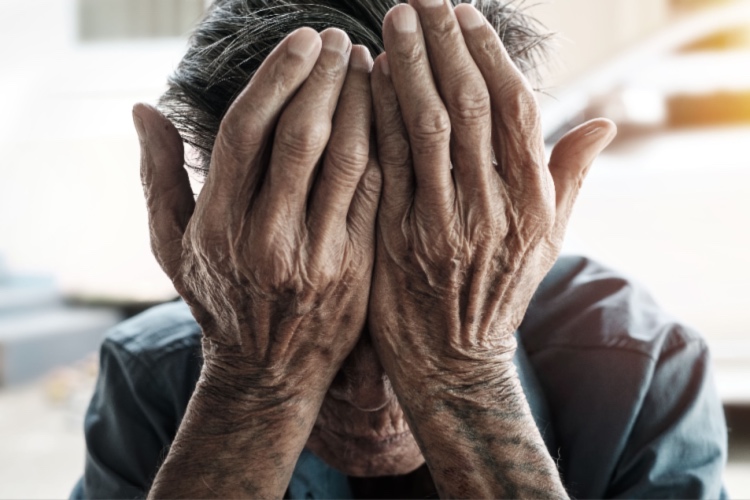
Elder abuse is a deeply troubling phenomenon that affects millions of seniors worldwide, often leaving lasting scars on its victims. From physical violence to financial exploitation, the mistreatment of older adults can have devastating consequences for their physical, emotional, and psychological well-being.
Table of Contents
- What Constitutes Elder Abuse?
- Psychological Effects on Victims
- Reporting Mistreatment
- Psychological Support for Elder Abuse Survivors
- Empowering Seniors and Healing Trauma with Blue Moon Senior Counseling
- FAQs
What Constitutes Elder Abuse?
Elder abuse is a pervasive and complex issue that encompasses a range of harmful behaviors directed toward older adults, often perpetrated by individuals in positions of trust or authority. Studies show that, elder abuse is experienced by about 1 in 10 people aged 60 and older who live at home. Elder abuse manifests in several forms, each with its own unique characteristics and indicators:
Physical abuse:
This form of abuse involves the intentional infliction of physical harm or injury upon an elderly individual. Examples include hitting, kicking, slapping, pushing, or restraining a senior.
Emotional abuse:
Emotional abuse encompasses verbal or non-verbal behaviors that cause psychological harm or distress to an older adult. This may include threats, insults, intimidation, humiliation, or manipulation.
Financial abuse:
Financial abuse occurs when a caregiver, family member, or acquaintance exploits or misuses an elderly person’s financial resources for personal gain. This can involve theft, fraud, coercion, or undue influence over financial decisions.
Neglect:
Neglect refers to the failure to provide adequate care, assistance, or support to meet an older adult’s basic needs. This may include withholding food, medication, hygiene assistance, or medical attention, leading to physical or psychological harm.
Recognizing Signs of Elder Abuse
Detecting elder abuse requires keen observation and an understanding of the various signs and symptoms associated with mistreatment. According to the National Institue of Aging, these are the most common signs:
Physical indicators:
Visible signs of abuse, such as unexplained bruises, cuts, burns, fractures, or other injuries, may indicate physical abuse. Seniors may also exhibit signs of poor hygiene, malnutrition, or inadequate medical care.
Behavioral changes:
Victims of elder abuse often experience significant changes in behavior, mood, or demeanor. These may include increased agitation, withdrawal, depression, anxiety, or fearfulness. Seniors may also exhibit signs of confusion, memory loss, or disorientation.
Financial discrepancies:
Financial abuse can leave a trail of financial irregularities, such as unexplained withdrawals, unauthorized use of credit cards, changes to legal documents (e.g., wills, powers of attorney), or sudden transfers of assets to unfamiliar individuals.
Understanding the Dynamics of Elder Abuse
Power imbalances:
In many cases, elder abuse occurs within the context of power imbalances, where the perpetrator holds authority or control over the victim. This may include family members, caregivers, or trusted individuals who exploit their position of trust for personal gain.
Social isolation:
Seniors who are socially isolated or dependent on others for care may be particularly vulnerable to abuse. Lack of social support networks or opportunities for social engagement can increase their risk of exploitation and mistreatment.
Caregiver stress:
Caregivers who are overwhelmed, overburdened, or experiencing high levels of stress may be more prone to engaging in abusive behaviors. Factors such as caregiver burnout, financial strain, or lack of support can contribute to the mistreatment of older adults under their care.
Psychological Effects on Victims
Research shows that elder abuse can have profound and far-reaching psychological consequences for its victims, impacting their emotional well-being, cognitive functioning, and social relationships.
Increased feelings of fear and anxiety:
Victims of elder abuse often live in a constant state of fear, unsure when the next episode of mistreatment will occur. This pervasive sense of insecurity and vulnerability can lead to heightened anxiety and hypervigilance.
Depression and isolation:
Elder abuse can profoundly affect a senior’s mental health, contributing to feelings of sadness, hopelessness, and despair. Victims may withdraw from social interactions, isolating themselves from friends, family, and support networks as a means of self-preservation.
Loss of trust:
The betrayal of trust by caregivers or family members can shatter a senior’s sense of security and confidence in others. Victims may struggle to trust even well-intentioned individuals, fearing further exploitation or harm.
Cognitive Impact
Elder abuse can also take a significant toll on cognitive functioning and mental well-being, exacerbating existing cognitive impairments and contributing to further decline:
Memory decline and cognitive impairment:
The stress and trauma associated with elder abuse can accelerate cognitive decline and exacerbate memory problems in vulnerable seniors. Victims may experience difficulties with concentration, attention, and problem-solving, impairing their ability to function independently.
Development of PTSD:
Elder abuse can precipitate the onset of post-traumatic stress disorder (PTSD) in victims, characterized by intrusive thoughts, nightmares, flashbacks, and hyperarousal. The traumatic nature of the abuse can leave lasting psychological scars, impacting a senior’s quality of life and emotional resilience.
Impact on decision-making abilities:
Victims of abuse may experience impairments in decision-making capacity, making it challenging to advocate for their own needs or seek assistance. Cognitive deficits resulting from abuse can undermine a senior’s autonomy and independence, further exacerbating their vulnerability to mistreatment.
Social Consequences
In addition to the individual psychological effects, elder abuse can also have profound social ramifications, affecting a senior’s relationships, social networks, and sense of belonging:
Strained family relationships:
Abuse within the family dynamic can fracture relationships and erode trust between older adults and their caregivers or family members. The betrayal of trust and breach of familial bonds can leave lasting scars on victims, complicating efforts to rebuild relationships.
Withdrawal from social activities:
Victims of elder abuse may withdraw from social activities, community engagements, and leisure pursuits as a means of self-protection. Feelings of shame, embarrassment, or fear of judgment can further isolate seniors, depriving them of essential social support networks.
Reporting Mistreatment
If you suspect or know that someone is being abused, the National Institue of Aging has provided a list of services available that can help:
- The National Adult Protective Services Association provides phone numbers for programs in each state on their website or by calling 202-370-6292.
- The National Center on Elder Abuse provides guidance on how to report abuse, where to get help, and state laws that deal with abuse and neglect. You can also call 855-500-3537 for more information.
- Long-term care ombudsmen advocate for the needs of people who live in assisted living facilities, board and care homes, and nursing homes. You can also call them at 202-332-2275.
Psychological Support for Elder Abuse Survivors
Recovery from elder abuse requires a holistic approach that addresses the psychological trauma and emotional distress experienced by survivors. Psychological support services play a vital role in helping survivors heal, rebuild resilience, and regain a sense of empowerment and autonomy.
Therapeutic Approaches
Various therapeutic modalities can support elder abuse survivors in their journey toward healing and recovery:
Cognitive-behavioral therapy (CBT):
CBT helps individuals identify and challenge negative thought patterns, develop coping strategies, and build resilience in the face of adversity. By addressing maladaptive beliefs and behaviors, CBT empowers survivors to regain control over their lives and navigate challenges more effectively.
Trauma-informed care:
Trauma-informed approaches prioritize safety, empowerment, and healing for survivors of abuse. Mental health professionals provide compassionate, client-centered care that acknowledges the impact of trauma on individuals’ lives and supports their journey towards recovery.
Rebuilding Self-Esteem and Resilience
Recovery from elder abuse involves rebuilding confidence, self-worth, and resilience in the aftermath of trauma:
Building coping mechanisms:
Therapy equips survivors with practical coping skills and strategies to manage stress, regulate emotions, and navigate interpersonal challenges. By learning healthier ways of coping, survivors can better manage the emotional fallout of abuse and cultivate greater emotional resilience.
Rediscovering purpose and meaning:
Engaging in meaningful activities, hobbies, or pursuits can help survivors reclaim a sense of purpose and agency in their lives. Whether through creative expression, volunteer work, or community involvement, finding joy and fulfillment can be integral to the healing process.
Fostering a sense of empowerment:
Therapy empowers survivors to assert their boundaries, advocate for their needs, and reclaim control over their lives. By fostering a sense of agency and self-determination, survivors can move from a position of victimhood to one of empowerment and self-advocacy.
Empowering Seniors and Healing Trauma with Blue Moon Senior Counseling
Empathy is the cornerstone of effective caregiving and advocacy for seniors. Understanding the experiences, needs, and emotions of older adults fosters trust, communication, and meaningful connections. At Blue Moon Senior Counseling, we embody these principles by providing compassionate, client-centered care to elder abuse survivors.
Through therapy, we empower survivors to overcome the psychological effects of abuse and thrive in their later years. With a focus on client-centered care and evidence-based practices, we are committed to supporting elder abuse survivors on their journey toward healing and recovery.
By accessing psychological support services such as those offered by Blue Moon Senior Counseling, elder abuse survivors can access the resources and support they need to heal from trauma, rebuild their lives, and reclaim their sense of well-being and dignity.
Take the first step and contact us today!
FAQs
- What are the most common types of elder abuse, and how can they be identified?
The most common types of elder abuse include physical abuse, emotional abuse, financial exploitation, and neglect. Physical abuse may manifest as unexplained bruises, cuts, or fractures, while emotional abuse can result in changes in behavior such as withdrawal or depression. Financial exploitation may be indicated by sudden changes in financial behavior or missing assets, and neglect may be evident through signs of malnutrition or inadequate medical care.
- How prevalent is elder abuse globally, and what factors contribute to its occurrence?
Elder abuse is a widespread issue, affecting millions of seniors worldwide. Several factors contribute to its occurrence, including social isolation, caregiver stress, and societal attitudes toward aging. Additionally, ageism and stereotypes about older adults can perpetuate misconceptions and normalize mistreatment, further exacerbating the problem.
- What are the long-term consequences of elder abuse on survivors’ mental health and well-being?
The long-term consequences of elder abuse can be profound, impacting survivors’ mental health, self-esteem, and quality of life. Many survivors experience ongoing psychological distress, including anxiety, depression, and post-traumatic stress disorder (PTSD). The trauma of abuse can also exacerbate existing health conditions and lead to increased healthcare utilization and diminished overall well-being.
- How can communities and individuals contribute to the prevention of elder abuse?
Preventing elder abuse requires a multi-faceted approach involving education, awareness-raising, and community engagement. Individuals can contribute by staying informed about the signs of elder abuse and reporting any suspicions to appropriate authorities or support services.
- How does Blue Moon Senior Counseling support elder abuse survivors, and what services do you offer?
At Blue Moon Senior Counseling, we provide therapy services for elder abuse survivors, tailored to their unique needs and experiences. Our licensed therapists offer compassionate, trauma-informed care to help survivors heal from the psychological effects of abuse and rebuild their lives. Our goal is to empower elder abuse survivors to reclaim their sense of well-being and dignity as they navigate the journey toward healing and recovery.




